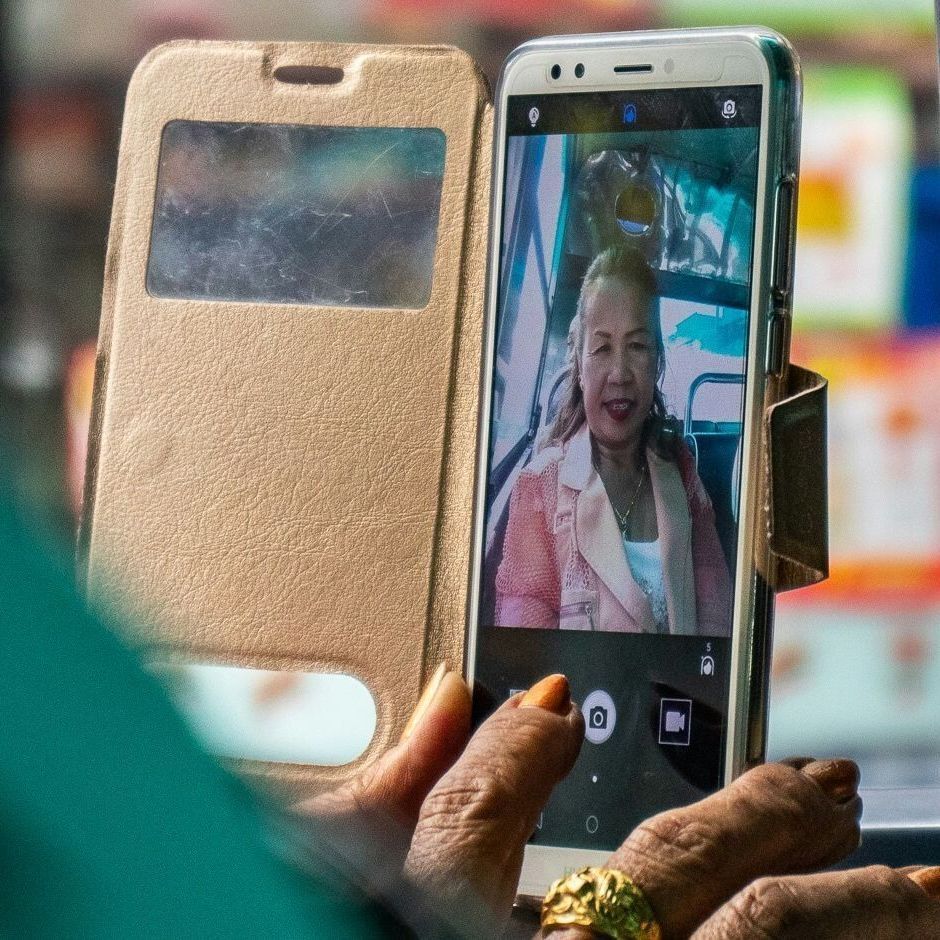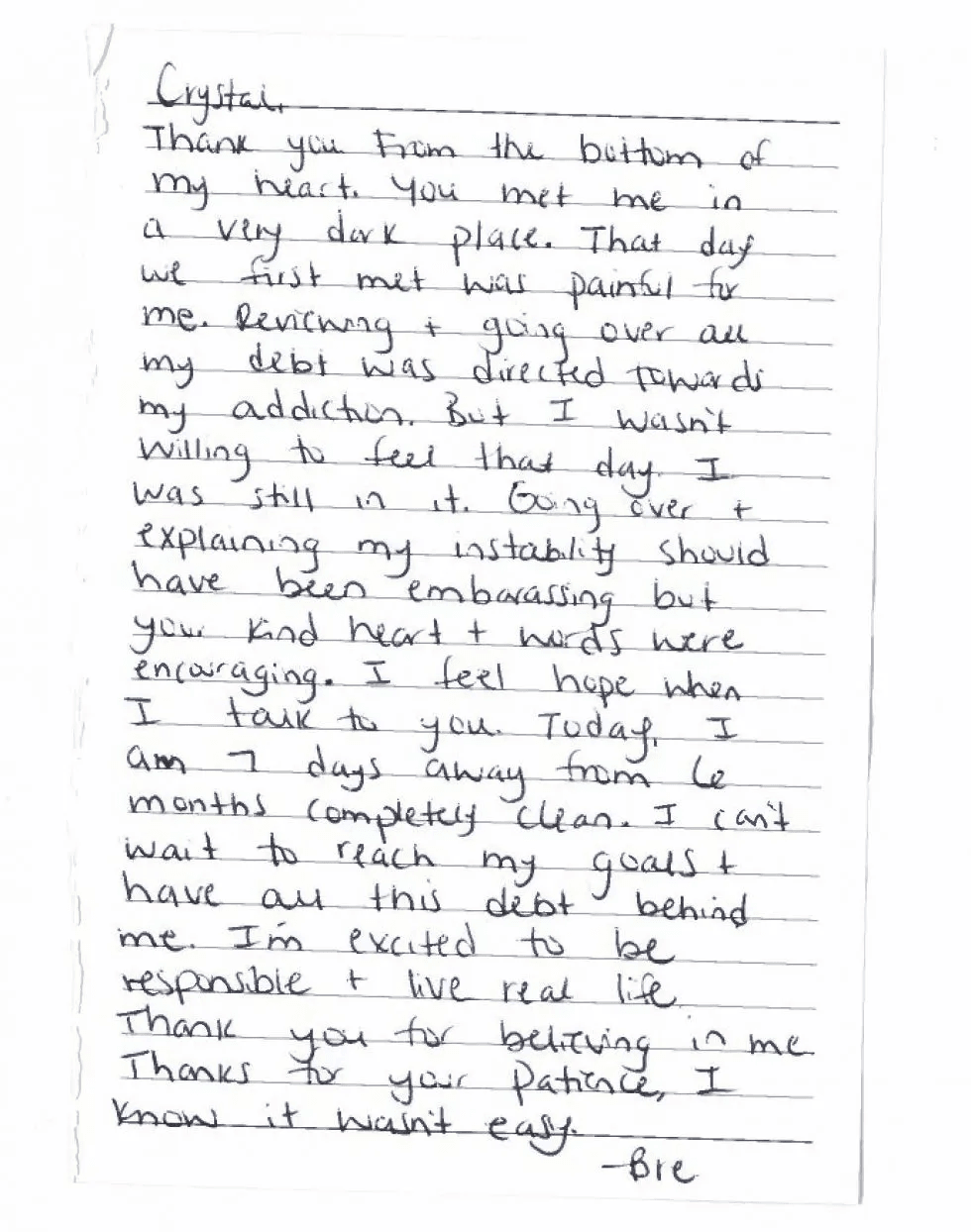
Last October, Nancy started getting letters in the mail from the Small Business Administration (SBA) - which was odd, because she had never applied for a business loan and is not a business owner. She received a letter from the US Treasury about a Small Business Loan she never applied for. One of the letters even threatened to withhold money from her social security checks.
“I was completely lost,” Nancy said.
That was when she called Legal Aid of Nebraska for help.
“My attorney, Paul, spent a lot of time with me to explain what was actually going on. He was doing everything he could, this gentleman was absolutely great,” Nancy said, “I just appreciate the fact that he could help.”
After meeting with Legal Aid Attorney, Paul, the first step was to run a credit report, but there was nothing unexpected and nothing about an SBA loan. Then he checked the public Pandemic Oversight database, which lists basic information about the Paycheck Protection Program or PPP loans. This kind of fraud was so common during the pandemic that the SBA and the Treasury launched a website to track how government money was spent on pandemic aid.
And there it was: in 2021, someone took out a fraudulent business loan in Nancy’s name for $13,000. She had never heard of the business and had not applied for a loan. But by this time the SSA had withheld several hundred dollars from her social security checks for payment.
Paul got to work helping Nancy gather the information she needed from the SSA, her bank, and the fraudulent loan. This required a lot of paperwork and took time, but eventually they had what they needed to prove Nancy’s identity had been stolen. They filed identity theft reports with the Federal Trade Commission and Small Business Administration. The SSA agreed to stop garnishing her SSI checks until the investigation was complete.
Based on the evidence Paul gathered, the SBA found that the loan was fraudulent and agreed to remove her name, cease further garnishment of her social security benefits, and return the money they had already taken from her.
We do not yet know how the scammers got Nancy’s information – but at a minimum, they would have had to have her full name, address, birth date, and social security number. This information is often called PII, or Personally Identifiable Information, it is especially sensitive because someone with bad intentions can use partial information to find enough data about you to use your identity.
“I would tell people that they need to be extra careful, especially with their bank account information, their social security card… anybody can take that information and use it and just literally destroy [their finances] like they did me.”
How to recognize financial scams and protect yourself from identity theft
1. Protect your Personally Identifiable Information (PII):
- Name, especially if you have a common last name
- Birthdate
- Social Security number
- Any part of your address, even just your zip code
- Driver’s license number
- Passport number
- Birth certificate
2. Check your credit at least once a year
Everyone can submit a FREE credit report once a year from the three major reporters – Equifax, Experian, and TransUnion – but if you suspect someone has stolen your identity, you should get a credit report as soon as possible.
Make sure you check the website address BEFORE you enter any information. Do not trust any website that does not have “https://” at the beginning. If the company’s name is misspelled or uses “.net” “.org” or “.us” - it is not the right website for these reports.
3. Never give PII over the phone
If you receive an unexpected call from your bank or another financial institution – ask to call them back. You can then look up the correct phone number and call to verify that the caller is a legitimate representative.
Your bank or financial institution should never ask for:
- Your full debit or credit card number, expiration date, pin number, and/or three-digit security code
- Your full Social Security number
- Your Driver’s License, Passport, or other ID number
If someone claiming to be from your bank asks for any of these things, end the call and visit the bank in person to provide your proof of identity instead.
“We see a lot of people who get threatening emails or calls demanding immediate action under threat of fines, jail or loss of property,” said Paul. “They use that to cause fear and create a sense of urgency to make it appear like the recipient doesn’t have time to seek advice or assistance before paying or acting. When those kinds of threats are made, it is all the more reason to seek assistance and advice before acting or giving out information.”
4. Be skeptical of any emails asking for personal information, especially if they have a link
When you receive an email, always look at the FROM email address, not just the name. Check to make sure the last part after the @ sign matches a legitimate company or organization’s website. Some organizations send automatic emails from a subdomain of their website, for example: email@alert.ally.com or fnbo@notify.fnbo.com.
If you are not sure, open a new tab in your internet browser and type in the company’s name, your preferred browser search should give you the company’s legitimate website. Better yet, if you have online accounts you use frequently, save the sign in page as a favorite in your browser so you never have to click more than once to get there.
Phishing is another email scam, where someone will send an email attempting to get personal information from you directly. These scams often appear to come from a family member or colleague.
If an email has any of the following warning signs, be cautious:
- It was unexpected – do not click a link or enter any information unless you were expecting paperwork to come to your email address and have confirmed with the sender
- If there is a warning, threat, or something indicates a timely emergency - use a different method of contact with the person it is from, such as a phone call
- You do not recognize the sender's email address or the email address is different from the organization's website
- There is no information about the sender, their company/organization, or the link - most legitimate organizations will have a signature from the sender and a standard information block with their contact information at the bottom of every email
Most importantly: do not click on any link or reply to any email before verifying it through another method of contact.
5. Report and Recover
Finally, you can report suspicious activity to local law enforcement and the Federal Trade Commission through their fraud reporting site, https://www.identitytheft.gov/
When you make a report, the site also creates a step-by-step recovery plan for you to take immediate action.
If you have been the victim of identity theft, Legal Aid of Nebraska can help. Call now to apply for FREE legal services:
ELDERACCESSLINE® (AGE 60+): 1-800-527-7249
Monday–Thursday: 9:00 am – 12:00 noon and 1:00 – 3:00 pm
Fridays: 9:00 am – 12:00 noon
Interpretation services available
STATEWIDE ACCESSLINE®: 1-877-250-2016
Monday/Wednesday: 8:30 – 11:30 am
Tuesday/Thursday: 1:00 – 3:00 pm
More information from other organizations
From AARP:
15 Top Ways You Can Protect Yourself From Fraud
Learn how to not engage. You are under no obligation in these modern times to respond to calls, emails or texts from strangers — especially given that so many of them are fraudulent. One option: Open your iPhone’s contact list and add your family, friends, doctors and other important numbers. Then go into your phone settings and turn on the setting for "silence unknown callers." This will send any caller who isn't in your contacts list directly to voicemail.
Learn to say no. Sometimes a caller will get through. Get tough: Say, “I do not do business over the phone. Goodbye.” Then hang up without remorse.
From the National Cybersecurity Alliance:
From the US Social Security Administration:
Article by Melissa Amarawardana
Stock image used to protect the client's privacy.



